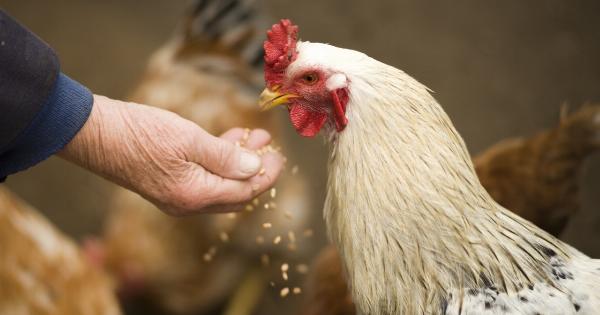When it comes to chickens, what they eat significantly impacts their overall health, well-being, and the quality of the meat and eggs they produce.
While conventional chicken feed mainly consists of grains and animal by-products, an alternative approach gaining attention is feeding chickens with a diet comprised primarily of vegetables. This article explores why chickens fed on vegetables tend to outperform their conventionally fed counterparts in various aspects.
1. Enhanced Nutritional Profile
A vegetable-based diet offers a more diverse range of nutrients compared to a conventional chicken feed. Vegetables provide essential vitamins, minerals, and antioxidants that contribute to the overall health of the chickens.
These nutrients are then passed on to the eggs and meat produced by the chickens, making them more nutritious for human consumption.
2. Reduced Risk of Antibiotic Resistance
Conventional chicken farming often involves the use of antibiotics to promote growth and prevent the spread of diseases within crowded conditions.
However, this practice has led to the emergence of antibiotic-resistant bacteria, posing a significant threat to human health. Chickens fed on vegetables are less reliant on antibiotics, reducing the risk of antibiotic resistance and promoting a more sustainable farming method.
3. Improved Omega-3 Fatty Acid Content
Vegetables, particularly leafy greens, are rich in omega-3 fatty acids. When chickens consume these vegetables, they accumulate higher levels of omega-3 fatty acids in their eggs and meat.
Omega-3 fatty acids offer various health benefits, including reducing inflammation, improving heart health, and supporting brain function.
4. Lower Environmental Impact
Traditional chicken farming practices often contribute to environmental degradation. Large-scale production requires substantial feed resources, land, and water.
In contrast, feeding chickens with vegetables can significantly reduce the environmental impact. Vegetables can be grown locally, minimizing transportation emissions, and potentially utilizing organic waste as feed, reducing reliance on industrial agriculture.
5. Enhanced Flavor and Texture
Chickens fed on a vegetable-based diet tend to have a more distinctive flavor and texture compared to conventionally fed chickens.
The diverse range of nutrients obtained from vegetables affects the overall composition of the meat, resulting in a richer taste and improved tenderness. Consumers often prefer the unique taste of chickens fed on vegetables, leading to higher demand for such products.
6. Reduced Chemical Residue
Vegetables used in chicken feed are typically grown using organic or low-pesticide methods. By feeding chickens a diet primarily composed of vegetables, the risk of chemical residue in the chickens’ meat and eggs is significantly reduced.
This is particularly appealing to consumers who prioritize organic and chemical-free food choices.
7. Healthier Chickens
Chickens that consume a diverse vegetable-based diet tend to be healthier overall. Their immune systems are strengthened, making them more resilient to infections and diseases.
Additionally, a diet rich in vegetables provides chickens with natural antioxidants that help combat cellular damage and promote overall well-being. Healthy chickens are less prone to stress-related issues, resulting in improved productivity and quality of the meat and eggs they produce.
8. High-Quality Eggs
Chickens fed on vegetables consistently produce eggs with higher nutritional value compared to conventionally fed chickens. These eggs contain increased levels of essential vitamins, minerals, and omega-3 fatty acids.
Additionally, the yolks of these eggs often showcase a more vibrant shade, indicating higher carotenoid levels. The superior quality and nutritional composition of these eggs make them highly sought after by health-conscious consumers.
9. Ethical Considerations
Vegetable-based diets for chickens align with animal welfare concerns. By allowing chickens to consume a more natural diet that includes vegetables, farmers provide them with mental stimulation and enrichment.
This practice is seen as a more ethical approach to chicken farming, ensuring the well-being and happiness of the animals. Consumers who prioritize animal welfare are increasingly drawn to products derived from chickens fed on vegetable-based diets.
10. Promoting Sustainable Agriculture
Moving towards a more vegetable-centric approach in chicken feeding contributes to the larger goal of sustainable agriculture.
By reducing reliance on conventional feed sources and integrating vegetables into chicken diets, farmers can promote a more environmentally friendly and economically sustainable farming system. This shift aligns with the growing consumer demand for ethically produced and sustainable food choices.



























